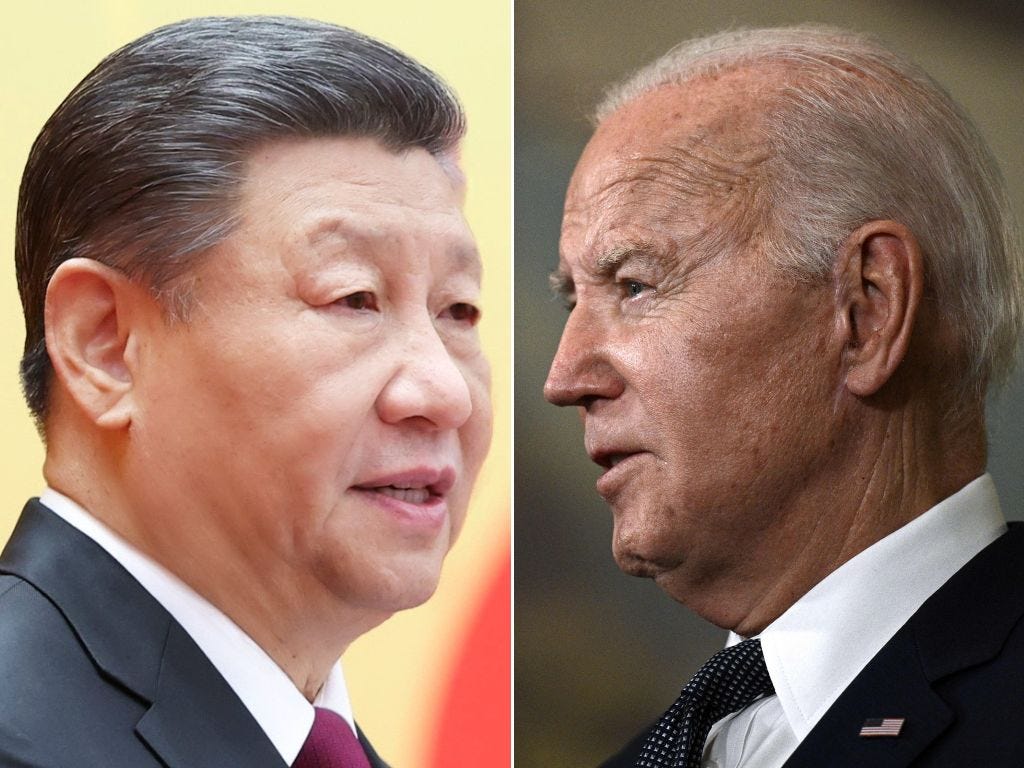Biden is fighting Trump's tough tactics by calling for tripled tariffs on Chinese steel imports
Ju Peng/Xinhua via Getty Images; Brendan Smialowski/AFP via Getty Images
US President President Biden has called for a tripling of tariffs on Chinese steel and aluminum.China is now exporting the most steel since 2016, when it was accused of causing a global glut.Trade tensions are expected to heighten in the 2024 US election year.US President Joe Biden last week called for a tripling of tariffs on Chinese steel and aluminum imports, echoing former President Donald Trump's levies on a range of goods from China.
Biden — who is the frontrunner for the Democratic Party's presidential nominee — said China's steel production was backed by state funds, which enable the commodity to be sold cheaply to the US. He wants to hike a key tariff on Chinese steel and aluminum from 7.5% to 25%.
Trump — who is the GOP's frontrunner — said in February he would slap tariffs of over 60% on Chinese goods if he's elected.
The one-upmanship between the two is likely to get more intense this election year as China's economy struggles to consume all that it's producing.
China is now exporting the most steel since 2016
Already, China is exporting the most steel since it was accused of causing a glut nearly a decade ago.
In March, China exported 9.9 million metric tons of steel — about 25% higher than a year earlier and the highest since 2016, according to a Bloomberg analysis of official data earlier this month.
The surge in exports followed a slump in China's real-estate sector that has cut demand for the building material.
"Steel, cement, and construction machinery are some of the worst-hit sectors, with excess capacity stemming from structural contraction in demand," Chim Lee, a China analyst at the Economist Intelligence Unit, wrote in an April 15 note.
However, the US isn't a large Chinese steel importer. The country is the seventh-largest steel shipper to the US, so Biden's threat is mostly symbolic.
"I want fair competition with China, not conflict, and we're in a stronger position to win the economic competition of the 21st century against China or anyone else," Biden said last week.
Trade tensions will be high this election year
Beijing hit back against Biden's criticism of China's industrial policy and accused the US of electioneering.
Lin Jian, a Chinese foreign ministry spokesperson, said at a Friday press conference that the American president's comments were "far-fetched."
Lin added that China's steel sector is geared toward meeting domestic demand and doesn't receive any export-oriented subsidies. He also accused the US of a "double standard" for implementing domestic subsidies and for using export controls on the pretext of national security.
"We urge the US to be prudent in its words and deeds, stop manipulating issues on China in the election year, stop turning economic and trade issues into security ones, lift additional tariffs on China, and stop imposing new ones," said Lin.
Still, China's current wave of steel exports is already spooking some countries, including Chile and Brazil that have, respectively, imposed higher temporary tariffs and import quotas on the commodity.
US Treasury Secretary Janet Yellen slammed China's overproduction earlier this month, saying the problem went beyond the US.
"China is now simply too large for the rest of the world to absorb this enormous capacity," said Yellen during her visit to China.
With the US election ahead and China's economy in a painful transition, it'll be a tough year for trade relations.
"Trade tensions related to steel and construction machinery will be high in 2024," wrote the EIU's Lee.


